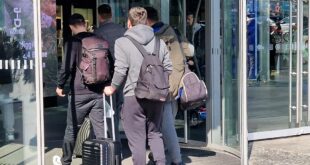The European Union (EU) wants to create a common European return system for so-called “illegal” migrants. To this end, the EU Commission presented a strategy paper in Brussels recently. “So far, we are not making good progress with the returns,” said EU Return Coordinator Mari Juritsch, who has been in office since May 2022. The number of repatriations had halved during the pandemic. Exact figures, however, are only available to the member states, she explained.
In order to increase the number of repatriations, the EU wants the member states to work together in a coordinated manner. For this purpose, the Commission has created a separate department within the border management agency Frontex, which is headed by Juritsch.
The reason for the new push to repatriate migrants is that the number of “irregular” entries into the EU has risen sharply in 2022, explained EU Commissioner for Home Affairs Ylva Johansson. The majority of these people are not entitled to asylum, but many still apply, she said. 966,000 asylum applications were received in 2022, according to the EU Commission. That is an increase of almost 50 per cent compared to the previous year, Johansson said. “This puts enormous pressure on our asylum system and reception capacities.”
Every year, there are around 300,000 return decisions in the EU member states, but only around 70,000 people actually return to their country of origin. “Those who are entitled to asylum are welcomed. Those who do not have this entitlement must return to their country of origin. This is how we protect the asylum system,” Johansson said.
The strategy paper contains four proposals. In addition to increased cooperation, which is intended to speed up the process, it is planned that migrants will be professionally supported during reintegration in their country of origin. Furthermore, the entire process is to be digitalised.
Adira Kallo
 THE AFRICAN COURIER. Reporting Africa and its Diaspora! The African Courier is an international magazine published in Germany to report on Africa and the Diaspora African experience. The first issue of the bimonthly magazine appeared on the newsstands on 15 February 1998. The African Courier is a communication forum for European-African political, economic and cultural exchanges, and a voice for Africa in Europe.
THE AFRICAN COURIER. Reporting Africa and its Diaspora! The African Courier is an international magazine published in Germany to report on Africa and the Diaspora African experience. The first issue of the bimonthly magazine appeared on the newsstands on 15 February 1998. The African Courier is a communication forum for European-African political, economic and cultural exchanges, and a voice for Africa in Europe.


























